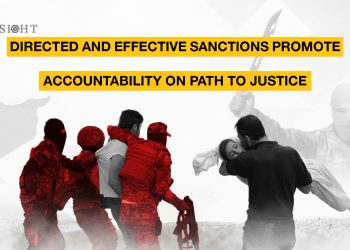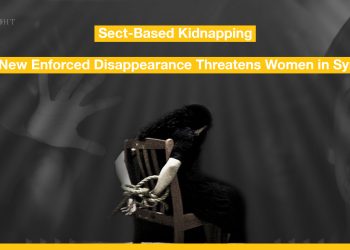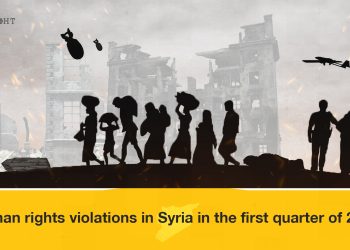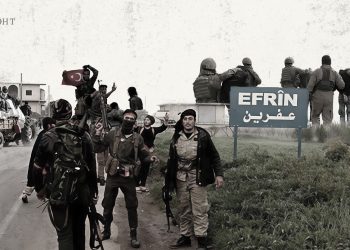Introduction
This report shed light on the events that took place after the killing of four brothers from Peshmerg family by militants of the Turkish-backed Syrian National Army (SNA), in the town of Jindires, north of Aleppo, northwest Syria, on Mar.20, 2023.
The crime occurred publicly, as it took place openly at the street, unlike other serious violations that remained hidden because they took place in closed places and detention centers.
The public outrage compelled the Hayat Tahrir al-Sham (formerly al-Nusra front) to intervene in the area, while both the SNA and the National Coalition of Syrian Revolutionary and Opposition Forces sought to portray the incident as an exception.
This report concludes that these same factors ultimately failed to bring justice to the victims and their families, instead leaving them vulnerable to further violations.
To compile this report, the INSIGHT Organization team conducted nine online interviews, including one with a family member, another with a resident of the neighborhood, and a third with an activist lawyer specializing in human rights in Afrin.
The report also relied on testimonies, previously obtained documents related to the case and analysis of materials from open sources concerning the incident, published between March 2023 and March 2024.
The majority-Kurdish region of Afrin, including Jindires, has been under the occupation of Turkey and its affiliated SNA factions since March 2018 following a large-scale Turkish military operation dubbed “Olive Branch”.
Local and international human rights reports have documented various violations committed by these factions against the original Kurdish population, amounting to war crimes and crimes against humanity.
These violations include killings, arbitrary arrests, torture, rape, and seizure of civilian property. Examples of such reports include “Everything is by the Power of the Weapon” by Human Rights Watch [1]and the study “Five Years of Injustice are Enough!” [2]published by several local and international organizations.
Premeditated murder
On the eve of Newroz, on March 20, the new year that is celebrated by Kurds all over the world, militants of Jaysh al-Sharqiya, a Turkish-backed SNA faction, carried out a systematic crime in the town of Jindires of Afrin countryside, shooting to death four civilian Kurds, from one family for igniting the Newroz flame, which is a key ritual of celebrating the holiday, in front of their house.
Nazmi Othman, 53, Farah al-Din Othman, 45, and his son Muhammad Farah al-Din, 19, and Muhammad Othman,38, who died later that night, while the remaining three died immediately in front of their house, affected by the bullets resting in their bodies’ upper parts, while a 15-year-old wounded child managed to survive.[3]
After a year from the incident, some of the killers and those responsible for the crime have yet to be held accountable; meanwhile, the families of the victims continue to live in an environment saturated with religious extremism and racial discrimination, the very same circumstances that led to the killing of the four victims.
Upon reconsidering the details of the incident and relying on certain open sources, witnesses and the victims’ families have confirmed that the assailants fired their weapons at close range, deliberately intending to kill. Additionally, they ensured the victims’ deaths and even staged the crime scene. [4]The victims suffered gunshot wounds to the chest, face, and neck, indicating premeditated murder.[5]
There were contradictions in the information provided by the Liberation and Construction Movement (LCM), a coalition of factions headed by Jaysh al-Sharqiya, denied that the perpetrators were affiliated to their faction.
Initially LCM claimed that the perpetrators were civilians from the eastern region of Syria but later admitted to the use of military-grade weapons and the presence of affiliated military personnel at the scene.[6]
Amid public outrage and protests in the region following the incident, which resulting turmoil within the ranks of the SNA factions, the authorities responded by urging the victims’ families to expedite the burials ceremonies under the supervision of the Civil Defense forces, they threw the bodies of the victims on the sidewalk of the military hospital in Afrin.[7]
The families of the victims restored to areas held by Hayat Tahrir al-Sham (HTS, formerly al-Nusra front) in Idlib, northwest Syria, where they transported the bodies. However, they returned to Jindires shortly after with HTS military support. The HTS leader, Abu Mohammad al-Julani, attended the funerals of the victims on March 21, threatening the SNA factions of intervention.
During that time, there were reports of mysterious movements and negotiations taking place within the military police building, according to an eyewitness. Subsequently, the faction announced the arrest of three of the perpetrators of the crime, with others being arrested later.[8]
On Jan. 17, 2024, the Military Criminal Court in the town of al-Rai in the countryside of Aleppo issued death sentences for some of those involved in the crime, it is important to note that this area lacks prison and court supervision.
The death penalty was imposed on Bilal al-Aboud for intentional murder, and on Omar al-Asmar, Habib al-Khalaf, and Abdullah al-Abdullah for their involvement in the intentional killing.
The court also sentenced Saddam al-Maslet, Ali al-Dabaa, Ahmad al-Hawas, and Fadi al-Mustafa to three months imprisonment for the offense of concealing a person whom they knew had committed a crime or helped him evade justice. Ali Jijan al-Khalaf was released due to insufficient evidence.
Perpetrator escaped accountability
Insight received, through Whatsapp, testimonies from a family member who requested anonymity for security reasons.
The witness said that despite the family’s calmness since the beginning of 2024, they continued to receive threats throughout the year.
Militants of Jaysh al-Sharqiya sent messages through intermediaries, offering to settle the case in exchange for a monetary sum. However, the family refused and demanded their right to trial the killers.
The family presented evidence and witnesses indicating that Ali al-Khalaf, also known as Abu Habib, was the main perpetrator of the murder, but they did not provide evidence implicating the others, despite this, the court acquitted Ali al-Khalaf, according to the witness.
“When the incident occurred, Muhammad Othman, went to the Complaints Office (within the headquarters of the Jaysh al-Sharqiya) located in the neighborhood where the family resides. However, he was attacked from behind by Abu Habib,” the witness said.
Additionally, Muhammad Othman was shot and stabbed, and the marks were present on his neck, he added.
According to other sources, it is reported that there were four witnesses in the courtroom who testified that Ali al-Khalaf (Abu Habib) fired shots at the victims from behind.[9]
According to one of the eyewitnesses, Ali al-Khalaf was acquitted due to support from Turkey, which allows individuals like him to act without accountability, while immediate imprisonment is imposed on Kurdish residents and those who return to their homes and properties.
The testimony obtained by Insight confirms that one of the perpetrators of the crime was acquitted despite the availability of evidence and witnesses, but the court acquitted him and claimed that the evidence was insufficient.
Ongoing threats to the Victims’ Families
The family has been subjected to ongoing threats, and it has not received any safety guarantees, counseling support, or legal assistance to attend court sessions.
According to the eyewitness who considers the family’ heading to al-Rai town as a retraumatizing experience, as they feel that their lives are at risk once again.
The witness also highlights that the threatening atmosphere in front of their house persists to this day. The families find themselves without any support, facing armed militants who belong to a faction controlling the city, a faction that is part of the dominant Turkish-backed SNA.
Prior to the crime, the victims were subjected to religious and racial extremism,[10] as the perpetrators referred to them as worshippers of fire.
In July, ARK channel shared a video showing paramedics from the Bahar organization transporting Nazmi Ashraf Othman (16 years old), the nephew of the victims, after he was attacked by armed militants affiliated with Jaysh al-Sharqiya faction.[11]
Furthermore, in August, a testimony from the young man’s aunt published on social media;[12] recounting a second death threat he received after refusing to unlock his phone. They took pictures of him following the assault.
The witness reports that her nephew asked the attackers why they were filming him; they responded that they would send it to Abu Ali (referring to Major Hussein Hamadi Abu Ali, the commander of Jaysh al-Sharqiya).
The family filed a complaint with the military police regarding the attack on their son and the threats he faces. Despite promises from the responsible authorities that they would arrest the attackers within days, the complaint remained futile.
The witness added, “Even after two months from the date of the massacre, there were people who would visit us and show support, but afterwards, people became afraid to even greet us.”
Militants of Jaysh al-Sharqiya faction, to which the perpetrators belong, still reside in the neighborhood and pass by the victims’ homes.
The Peshmerg family, who lost four of their members on the eve of Newroz 2023, continues to face ongoing threats of revenge in the absence of supervision and protection for them, allowing the criminals to escape punishment.
According to the United Nations General Assembly’s Declaration of Basic Principles of Justice for Victims of Crime and Abuse of Power adopted in 1985, paragraph D of Article 6 emphasizes the importance of minimizing the victims’ distress, safeguarding their privacy when necessary, ensuring their safety, as well as the safety of their families and witnesses who testify on their behalf, by preventing intimidation and retaliation.
Despite the immense psychological anguish caused by the loss of their loved ones, the victims and their families remain in a state of fear and threat since the crime occurred.
Al-Rai court
The Syrian government has halted the operations of its official institutions, including the judiciary in areas out of its control since the 2011 protests and subsequent armed conflict.
The opposition has established courts with the support of Turkey in its held-areas; these courts rely on judges, some of whom hold degrees in Islamic Sharia, to enforce Syrian laws based on the 1950 Syrian Constitution.[13]
In October 2018, the inauguration ceremony of the Justice Palace in the town of al-Rai was attended by the Governor of Kilis in Turkey, Mehemt Tekinarslan, his deputy Fahmi Sinan Niyaz, and the Attorney General of Kilis, Zafar Karacay Oglu, along with local officials from the local council and Syrian opposition military personnel.
The Justice Palace was considered the central court and the reference for the courts in the areas controlled by the Turkish-backed opposition.[14]
However, as with the inauguration ceremony, monitoring of the court’s verdicts and the fate of the cases being heard indicates their susceptibility to the influence of armed factions and Turkish authorities.
In October 2018, Turkish officials attending the opening ceremony included the governor of Kilis, Mehmet Tekinarslan, his deputy Fahmi Sinan Niyaz and Kilis’ attorney general, Zafar Karaja Oglu, as well as local officials from the local council and Syrian opposition military personnel.
The Justice Palace is considered the central court and the primary authority for the courts in the areas controlled by the Turkish-backed opposition.
However, as observed from the follow-up of the court’s rulings and the outcomes of the cases handled there, they are influenced by armed factions and the Turkish authorities.
Regarding the verdicts issued against the perpetrators of Peshmerg family case in Jindires, Gabriel Mustafa, a former co-chair of the Bar Association of the Autonomous Administration of Afrin, views the judgments as “symbolic, an attempt to deceive the victims’ families and human rights organizations.”
“The al-Rai Court will not carry out the verdict because the execution of the death penalty requires obtaining permission from government judicial authorities according to national laws,” Mustafa added.
Al-Rai court has issued death sentences against approximately 100 individuals, none of which have been executed.[15]
In terms of imprisonment sentences, the lawyer highlights a concerning issue. He emphasized that the prisons in al-Rai, Azaz, and others in the opposition-held areas operate without any oversight, stressing that “They do not allow observers from any human rights organization to enter.”
Incidents of transferring Syrians to Turkish territories for trial, an illegal procedure, indicate the submission of these courts to the Turkish will.[16]
Insight obtained a testimonies from the wife of a missing person held in faction prisons since 2019, the lawyer informed her that he could no longer continue searching for her husband because the Turkish authorities suspended his work for three days as a warning to stop accepting cases of Kurdish prisoners who have been detained without trials and whose fate remains undisclosed, as Turkey considers them terrorists.
The wife of the missing person further added that the lawyer entrusted with the case said he was forced to delete her contact number and leave the case.
The same missing person’s family also received a call from individuals claiming to be members of the SNA factions, demanding ransom or threatening to hand him over to Turkish intelligence.
Human Rights Watch, in its report “Everything by the Power of the Weapons,” released in late February 2024, dedicated a chapter titled “Sham Trials” to demonstrate how the military judiciary of the interim government deals with cases involving Kurds.
According to Human Rights Watch, the entire military justice apparatus is itself comprised in large part of former SNA officials, with judges appointed in coordination with Turkish intelligence agencies.
These military courts lack independence, impartiality, and adherence to due process, with judges subject to military command and superior orders. [17]
Four former detainees said that when they finally appeared in front of judges at the military court, they told them that they were subjected to torture, but that the judges did nothing about it.
One judge advised a rape victim to remain silent to preserve her reputation, and another judge told a torture victim that he couldn’t jail the man who did because they’ll retaliate against him too.
The first witness (a family member) said that everyone encouraged the victims’ families to go to court, but they did not provide any guidance or assistance.
Regarding their hope for justice, the witness added, “There are no human rights in Afrin.”
The overall atmosphere in areas controlled by the SNA factions promotes extremism and racial discrimination against Kurdish residents, leading to a conducive environment for further crimes and violations. This is exacerbated by the lack of accountability, particularly since the judges and prisons are under the authority of the military, to which the perpetrators belong.
One Kurdish resident in the neighborhood told Insight that he heard about Jaysh al-Sharqiya faction receiving orders to hold a symbolic celebration for the Newroz holiday in 2024 as a deceptive tactic to manipulate human rights and humanitarian public opinion.
The witness added that their actions are an attempt to conceal or improve their image, pointing out that in previous years, “they didn’t even permit us to light a candle.”
According to the documented evidence, armed individuals affiliated with the SNA factions in Afrin deliberately shot and killed eight people in 2023, while 19 others were injured in similar incidents.
Racial discrimination and extremism against the culture, language, and beliefs of the original population and minorities in areas under the control of the Turkish-backed SNA factions lead to various acts of violence and attacks. This includes the Jindires crime, where four members of the same family were killed due to celebrating a ritual from their social and national customs.
Legal Analysis
Based on a legal analysis conducted by a lawyer following the case for the report prepared by Insight, the judgment was issued based on the Syrian Penal Code, issued by Legislative Decree No. 148 of 1949.
The judgment imposed the death penalty on Bilal al-Aboud per Article 535 of the Penal Code for intentional murder aiding a criminal’s escape. Omar al-Asmar, Habib al-Khalaf, and Abdullah al-Abdullah received the death penalty under Article 535, linked to Article 212, for premeditated murder. Saddam al-Muslat, Ali al-Dabaa, Ahmad al-Hawas, and Fadi al-Mustafa were sentenced to three months’ imprisonment for concealing a known criminal or aiding his evasion of justice per Article 221 of the General Penal Code. Ali Jijan al-Khalaf was acquitted due to insufficient evidence.
The death penalty, despite being issued according to the Syrian Penal Code, it faces a legal challenge. Article 43 states that execution requires Clemency Committee opinion and Head of State approval. Article 461 mandates the Minister of Justice to refer the case, with the court’s report, to the Clemency Committee. Within five days, the committee reviews and determines execution or alternative penalty.
According to the legal text, death sentences are executed after the approval of the death sentence by the Court of Cassation. The case files are sent to the Special Clemency Committee at the Ministry of Justice, which is established by a decree from the President of the country. The committee’s task is to study the files and make a recommendation to the President of the country regarding either the execution of the sentences or the proposal of clemency. However, the President is not bound by the committee’s opinion. Therefore, according to Article 43 of the Penal Code and Articles 454 and 461 of the Code of Criminal Procedure, the President of the Republic is considered the final decision-maker.
Since the Ministry of Justice in the interim Syrian government does not have a Special Clemency Committee due to the absence of a position for the President of the Republic, the appointment of judges to the Special Clemency Committee is only possible through a decree issued by the President of the Republic in his capacity as the head of the Supreme Judicial Council. This makes the execution of the death penalty impossible due to the inability to complete the legal procedures stipulated in the Penal Code and the Code of Criminal Procedure for the implementation of the death penalty.
As for the guarantees for implementing the judgment, the execution of any judicial ruling relies on the independence of the judiciary, the principle of separation of powers, and the exercise of judicial authority to oversee the implementation of judgments.
Recommendations:
Recommendations for the local judiciary:
- Judges should ensure that all trials are conducted in accordance with the principles of justice and transparency, both in terms of procedures and judgments, without any interference from SNA’s factions or Turkish authorities on the issued judgments.
- Judges should ensure that judgments issued by the court are in line with the laws and international conventions while respecting the rights of the accused and defendants guaranteeing their right to a fair trial.
- Judges should work towards achieving justice without any racial or political discrimination, and all individuals should be treated equally before the law, regardless of their origins or political affiliations.
- Judges and public prosecutors should collaborate with independent human rights organizations and allow them to monitor and review the performance of the judiciary to ensure the respect for human rights and the attainment of justice
- Granting the specialized judicial authority the right to hold accountable judges who are proven to have been negligent in their duties, acquitting the accused individual Ali al-Khalaf without considering their culpability, and ordering their retrial as a key participant in the mentioned crime.
Recommendations to the international community:
- Call for an independent and comprehensive investigation: The Human Rights Council should urge both United Nations bodies, the Security Council and the General Assembly, to initiate an independent and comprehensive investigation into the violations and crimes committed in areas under the control of the Turkish-backed armed opposition factions.
- The international community should exert pressure on the Turkish government to ensure fair trials and protect civilians from any form of ethnic discrimination
- The international community should call for the prosecution of leaders and officials responsible for committing crimes, ensuring that they face justice before the appropriate international courts dealing with war crimes and crimes against humanity, regardless of their location.
To the International Commissions of Inquiry:
- The commission of inquiry should conduct a comprehensive and independent investigation into all violations and crimes committed in the relevant areas, including an examination of the judicial judgments issued.
- The commission of inquiry should document all evidence and testimonies related to the committed violations and crimes, ensuring the protection of witnesses and detainees.
- The commission of inquiry should make necessary recommendations based on the findings of the investigation to the international community and relevant entities, to ensure justice is served and to prevent the recurrence of violations in the future.
- The commission of inquiry should transparently publish the results of the investigation into the committed crimes and
- violations, ensuring accountability and prosecution.
[1] Human Rights watch: “Everything is by the Power of the Weapon”
[2] Syrians for Truth and Justice: “Five Years of Injustice are Enough!”
[3] Orient Channel: Child witnesses father’s killing by Jaysh al-Sharqiya militia in Jindires
[4] Orient Channel: Women who are relatives of the victims recount the details of Jindires crime
[5] Human Rights Watch: Turkey-Backed Fighters Kill 4 Kurdish Civilians
[6] Syria channel: an interview with the leader of the LCM discussing Jindires crime.
[7] Target platform: Relative of the victims reveals shocking details about the crime
[8] The LCM: statement on March 21 shows three suspects
[9] SOHR : formal” judgment against killers of “Newroz Massacre” and families of victims demand justice
[10] Report of the Independent International Commission of Inquiry on the Syrian Arab Republic Sep.11, Oct.6, 2023
[11] Ark Nuce : An armed group attacks and tortures the young man Nazmi Ashraf Othman in the town of Jindires
[12] Appeal regarding the attacks on Peshmerg family in Jindires
[13] Statement by the Minister of Justice in the interim government
[14] Al-Monitor: Northern Syria takes step toward new judicial system
[15] Enab Baladi : Al-Rai court sentences five militants
[16] International Commission of Inquiry on the Syrian Arab Republic: Transferring Syrians to Turkey
[17] Human Rights Watch: Everything by the Power of the Weapons






